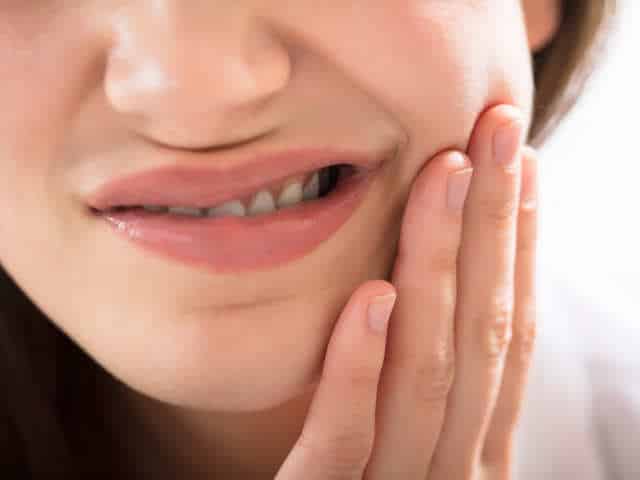Pain in the mouth is like no other.
It’s no wonder, really, since it’s hard to avoid the very things that can trigger the pain – like chewing, drinking, or even breathing. Your mouth is directly connected to the tendons, ligaments, and muscles of your face, sinuses, head, and neck—so mouth issues can also quickly become a big pain in other areas.
Since your mouth is so “well connected,” it’s all the more important to quickly get to the bottom of anything that makes you say “ouch!” when you’re eating, drinking, or simply existing.
“Unless you know the exact cause of your dental pain, go see your dentist,” advises Austin Dentist. “You could have a cavity, gum disease, chipped enamel, or something else that’s only going to get worse and get more expensive the longer you wait.”
The reasons behind tooth sensitivity range from causes that require little intervention to more serious issues only your dentist can address. The most common causes of tooth sensitivity include:
Bleaching and whitening products. The bleaching agents in whitening products demineralize your tooth enamel and can make your teeth more sensitive to heat, cold, and even the air you breathe. Your teeth will normally re-mineralize on their own, with the help of your saliva.
If teeth whitening products are painful for you, ask your dentist which products they recommend. Consider professional whitening, as your dentist can apply product that contains fluoride and potassium nitrite to help combat the sensitivity.
Receding gums, causing the roots of the teeth to become exposed and sensitive. Roots don’t have a protective layer of enamel, so receding gums are a leading culprit behind tooth sensitivity.
Aside from over-the-counter toothpastes formulated for sensitive teeth, your dentist can prescribe an even more effective toothpaste with a higher concentration of fluoride. “The over-the-counter toothpastes only coat the teeth and roots,” explains Dr. Nguyen. “Prescription-strength toothpaste actually incorporates into the tooth to desensitize it.”
In more extreme cases of receding gums, your dentist may suggest surgical grafts to cover exposed roots.
Erosion of the tooth enamel. When the protective outer layer of the enamel is worn away, dentin is exposed and can cause sensitivity. Erosion can be caused by brushing too hard, a diet heavy in acidic foods and beverages, tooth grinding, jaw clenching, and even nail-biting.
Weakened tooth enamel can be restored by re-mineralizing the teeth; damaged enamel may be treated with bonding of a dental resin to the tooth surface.
Cavities also expose your dentin and the nerves of your teeth, creating sensitivity.
Depending on the location and severity of the cavity, treatment can range from a simple filling to a root canal and crown.
Trauma, such as a blow to the face, can crack or chip a tooth, as well as leave your gums and dental ligaments sore for a few days.
If you’ve taken a hard hit to your teeth, the sensitivity may go away on its own as your mouth heals, but you should have your dentist check for other damage. If there’s a crack or chip exposing the deeper tooth structure and nerves, it’s not a wait-and-see situation. It will only get worse.
Misalignment of your bite can also create sensitivity. Your teeth may have shifted over time or your bite may become misaligned as a result of dental work or DIY clear braces. This may cause an overall feeling of sore teeth or pain on one side of the mouth.
Sinuses are very close to the roots of your upper rear teeth. A sinus infection or inflammation can cause pain that feels like it is coming from your teeth. If during an examination, your dentist finds no dental reason for the pain, you might be referred to a physician to check for a possible sinus condition.
In the meantime…
It is always best to see your dentist as soon as possible when tooth pain and sensitivity is relentless. But, if you can’t see your dentist right away, here are some home remedies you can use to ease the pain until you get in for your appointment:
- Saltwater rinse: Salt has antiseptic properties, helps reduce inflammation, and can help reduce the build-up of plaque. A teaspoon of salt dissolved in a cup of hot water is all it takes. Let it cool and then swish through your mouth.
- Oil “pulling:” Swishing coconut oil through your mouth can help reduce plaque and plaque-induced gingivitis (inflammation of the gums).
- Honey rinse: Honey’s known antiseptic and anti-inflammatory qualities can help with sensitive tooth pain. As with a saltwater rinse, dissolve a teaspoon of honey in hot water, let it cool, and then swish.
- Clove oil: A well-known home remedy for sensitive teeth, scientists have confirmed it that clove oil has natural pain-killing properties. Just don’t expect immediate relief—it can take five to 10 minutes for it to take effect.
- Avoid triggers: Foods and drinks that are highly acidic are best avoided until the cause of your sensitivity is diagnosed and treated. Try to keep food and drink temperature lukewarm, and use a straw for iced drinks.
TRU Dentistry Austin welcomes emergency walk-ins as well as sees patients after-hours so no one has to endure pain while waiting for an appointment or the office to open.
And now through the end of the year, we’re offering new patient specials to help you achieve a healthy, beautiful smile! Book your appointment today and experience the TRU difference!

